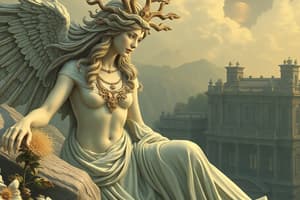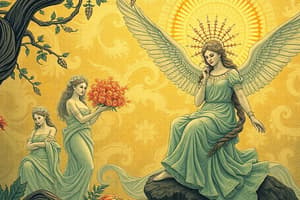Podcast
Questions and Answers
From which Greek word does the word 'myth' originate?
From which Greek word does the word 'myth' originate?
- Mythos (correct)
- Logos
- Epos
- Ethos
Myths are always factually accurate.
Myths are always factually accurate.
False (B)
A myth may be told by which of the following means?
A myth may be told by which of the following means?
- Orally
- In written form
- Through painting
- All of the above (correct)
What do some specialists in the field of mythology attempt to distinguish from "true myth"?
What do some specialists in the field of mythology attempt to distinguish from "true myth"?
Myth provides:
Myth provides:
What is the Greek word for cause from which the theory of etiology is derived?
What is the Greek word for cause from which the theory of etiology is derived?
Who claimed that the gods were men deified for their great deeds?
Who claimed that the gods were men deified for their great deeds?
Match the individual to their theory related to Mythology
Match the individual to their theory related to Mythology
Flashcards
Myth
Myth
A traditional tale, often oral, that explains the origins of cultural practices, beliefs, or natural phenomena, typically involving gods and the supernatural.
Saga/Legend
Saga/Legend
A story with roots in historical fact, though often embellished and imaginative.
Folktale
Folktale
A tale, often of adventure, intended primarily for entertainment, with fantastic elements and clever heroes.
Myth vs. Truth
Myth vs. Truth
Signup and view all the flashcards
Etiological Theory
Etiological Theory
Signup and view all the flashcards
Euhemerism
Euhemerism
Signup and view all the flashcards
Allegorical Interpretation
Allegorical Interpretation
Signup and view all the flashcards
Nature Myths (Max Müller)
Nature Myths (Max Müller)
Signup and view all the flashcards
Freud's Influence on Mythology
Freud's Influence on Mythology
Signup and view all the flashcards
Oedipus Complex
Oedipus Complex
Signup and view all the flashcards
Electra Complex
Electra Complex
Signup and view all the flashcards
Dream-Work
Dream-Work
Signup and view all the flashcards
Freud's Dream Interpretation
Freud's Dream Interpretation
Signup and view all the flashcards
Jung and the Collective Unconscious
Jung and the Collective Unconscious
Signup and view all the flashcards
Archetypes
Archetypes
Signup and view all the flashcards
Myth and Ritual
Myth and Ritual
Signup and view all the flashcards
Myth as Social Charters (Malinowski)
Myth as Social Charters (Malinowski)
Signup and view all the flashcards
Lévi-Strauss and Structuralism
Lévi-Strauss and Structuralism
Signup and view all the flashcards
Binary Oppositions
Binary Oppositions
Signup and view all the flashcards
Propp's Structural Analysis
Propp's Structural Analysis
Signup and view all the flashcards
Burkert's Synthesis of Structural Theories
Burkert's Synthesis of Structural Theories
Signup and view all the flashcards
Myth as a traditional tale
Myth as a traditional tale
Signup and view all the flashcards
Identity of a traditional tale
Identity of a traditional tale
Signup and view all the flashcards
Foundations as motifemes actions.
Foundations as motifemes actions.
Signup and view all the flashcards
Myth Applied
Myth Applied
Signup and view all the flashcards
Myths from primitive societies
Myths from primitive societies
Signup and view all the flashcards
Feminist Critical Theories
Feminist Critical Theories
Signup and view all the flashcards
Citizenship in Ancient Greece
Citizenship in Ancient Greece
Signup and view all the flashcards
Theme of Pursuit
Theme of Pursuit
Signup and view all the flashcards
Homosexuality
Homosexuality
Signup and view all the flashcards
Study Notes
Interpretation and Definition of Classical Mythology
- Establishing a definitive myth description proves elusive, but it hasn't stopped scholars from researching its importance and meaning.
- Principal surveys are accessible, focusing on theories likely to be successful or that have stood the test if time.
- No single theory is sufficient to define myth, they vary too greatly in their origins and importance
- Definitions either too limiting or too broad to be useful. Definitions can clarify particular aspects and create criteria to classify myths.
- The origin is from the Greek word mythos for "word", "speech", "tale," or "story," essentially what a myth is.
- True myth story must have proven itself worthy of traditional status
- Oral or its given written form are both acceptable for myth
- Specialists differentiate "true myth" or "myth proper" from other types, such as legend, saga, and folktale
Myth, Saga or Legend, and Folktale
- Myth is a comprehensive term for stories primarily about the relationship between gods and humans
- Saga or Legend (used interchangeably) has a noticeable connection to history, though it's often fanciful
Folktales
- Folktales often tales of adventure, peopled with fantastic beings, and fueled by the cunning strategies, primarily for entertainment
- Fairytales can be classified as particular folktale types of short, imaginative traditional tales with high moral and magical content
Categories
- These traditional categories offer guidance in ordering the variety of classical tales.
- Categories such as myth, folktale, legend, saga, can overlap/be loose
- Examples are legends of Odysseus/Argonauts, historically rooted yet filled with mythic/folktale aspects
- The criteria to define all the categories often merge, and demarcation lines blur between them all
Myth and Truth
- Greek word for myth meaning "word," "speech," or "story”,
- Aristotle used it to identify the plot of a play
- Popular view equated myth with fiction
- Association of myth and mythical is with what’s incredible/fantastic
- Distinctions exist between stories, perceived as true/not true
- Contrast between myth and reality has been a philosophical concern since early Greek philosophers.
- Myth is a multifaceted phenomenon that provides cultural unity in a fragmentary world.
- Religious concepts of gods and Plato’s vision of afterlife are mythic, no scientific
- Myth offers absolutes to insecure/terrifying existences
- There is a disturbing realization that trust in factual truth and absolutes can be shaken easily
- Truth/facts change in science
- Myth is truth on different level than transient factual knowledge
- Myths embodying eternal values can include period-correct scientific accuracy
- Accuracy may be important to a myth's purpose; any historical fact interpretation is mythic innovation
- Artists can make nonhistorical myths meaningful through ages irrelevant of factual accuracy
- Myth=Highest reality- dismissal considered barren
- Martha Graham said art is eternal because reveals the inner landscape, soul of man, versus discoveries/sciences
- "true myth" as distinct from saga/folktale, is concerned with gods, religion, and supernatural
- Greek/Roman stories reflect creation, nature of deities, humans, the afterlife, and spiritual concerns
Myth and Religion
- Mythology/religion bound inextricably
- Tales believed factually and spiritually in past, may continue today
- Collections of material for studying world mythologies are dominated by religious texts
- Religion ceremonies/cults based on mythology re-occur
- Examples: Zeus at Olympia, Athena at Athens, Demeter at Eleusis, and other mystery religions from the ancient world
- Interpretations for myth origins are later discussed
Mircea Eliade
- One of the most prolific twentieth-century myth writers, emphasis of religious aura lies in its conception as tale satisfying yearning/orientation in sacred timelessness
- Fully satisfied by stories narrating beginnings/origins
- Believes god once created world
- Cosmogeny becomes origin myth, the model for creations/stories
- Concept develops into complex mysticism
- Like sacrament, myth provides spiritual freedom from historical time
- True myths fundamentally important to society
- Embrace explanatory universe, to universal theory
Myth and Etiology
- Narrowly-Myth interpreted as explanation of origin of fact/custom
- Theory- Etiological, from Greek for cause
- Mythmaker- Primitive scientist, explaining unknown w/ society knowledge at time
- This theory fits certain myths like the account for ritual/cosmology origin
- Doesn't allow metaphysical/imaginative scope of mythological thought if interpreted literally/narrowly
- Explanatory broad definition might find theory most applicable of all monolithic theories
- Myths try to explain physical, emotion, spiritual literally, realistically, figuratively, metaphorically
- They try to explain world, beings, body/soul dichotomy, good/evil source, with all matters like love
- Hard to tell story not revealing/explaining anything
- Universally, imaginative response is theological/scientific somehow
- Issue- It doesn't identify myth specifically, distinguished, and religious/scientific/artistic
- Many stories are basically etiological
Rationalism Versus Metaphor, Allegory, and Symbolism
- Rationalizing classical mythology goes back to classical antiquity
- Especially Euhemerus claims gods= Men deified for deeds
- Zeus was mortal king in Crete who deposed Cronus
- Opposite extreme from Euhemerism is metaphorical interpretation story
- Antirationalist prefer metaphorical interpretations/traditional tales in deep meanings
- At best metaphor sees myth as allegory (sustained metaphor), story's details= universal truth
- At worst metaphor is barren exercise in cryptology
- Explain myth, clouds, weather =not enlightening/ennobling.
Allegorical Nature Myths: Max Müller
- influential 19th century, myths=nature myths, all meteorology, cosmological/developing allegorical approach
- Hard to explain why are all allegories of daytime/night/winter/summer
- Some true myths/gods, represent sky/natural order
- a lot of the true myths have no relation at all to nature
Myth and Psychology
- Freud: metaphorical approach took many forms in the 20th century through Psychology/psychoanalysts.
- Freud- Views not completely new
- "determinism,"- is found in Aristotle
- Human inner-world remains stamp of genius.
- All things as imaginative alleviating, directive are confirmed validity premises.
- Endless critical controversy merely confirms his contribution.
Carl Jung
- Jung, student but was deeply indebted to the master
- relevant appreciative theories mythology
- Freud's contribution are sex emphasis
- The unconscious theory
- Dream and interpretation
Freud
- Oedipus tale
- Is used due to our own fate/same impulses still extant now if are suppressed
- Masculine form but also relationships between his mother+behaviour/also daughter, father/ becomes hostile to her rival
- Jung- This is Electra complex
- Dreams are fulfillment wish repressed/disguised
Jung: Dream-work
- To protect/sleep anxiety, the mind three mental activities-
- "condensation" of elements- are abbreviated
- "displacement" of elements- Particularly emphasis
- "representation"- transmission imagery with sexual
- Similarly, the origin/myth evolution, insight-mind creative artists. Freud discoveries-dream lead similarity follow/analyze significance myths and to reveal what dream symbols are
- Example: stick, swords= sexual symbols phallic
- Freud, waking systematize neurotics are similar in sleep. revealed of sleep
- Patterns like the unconscious the eating a sacrilege. Oedipus primal
- Freud connection/dreams illuminate all myths; complex beginning, ethics.
Carl Jung and the Collective Unconscious
- Jung to interpret dream of unconscious revelation
- Made distinction:unconscious/conscious
- Personal is and questions
- Myths have Archetypes, embraced dreams, years depends discovered Archetype there; many thought, are
- patterns inherited humans patterns in behaviors and are born/identifiable mythological myths
- Modals teaching show. image the in a it first man
- Olds etc
- Jung emphasize traditional Sophisticated examined theories limitations.
Legacy of Freud
- Theories attracted criticisms
- Classical speak would; remains and are for with language, etc.
- Historical language remain.
- Theory dream repressed
- Desire incest first enforced that theories.
Freud with Theory
- Are with concerned have
- Work fundamental; variations.
- We theory in.
Myth and Society
- ritual one influential
- Frazers limitations
- Similar in that comparative same established 20th attitudes. valuable fascinating Literary types.
Myth and Social Charters
- important Maliki world, explain traditions traditions
- Such theory may be
Structuralists
- enriched important between societies
- like music the codes existence other total
Burkett
- the has time
- Myth
- The of tradition.
- Then
- To biologial program to collective.
- These approach
Comparative Study of Classical Mythology
- studies literature.
- is insist and time vision tribe humankind passed.
- Tales the which for those literariness .
- Is and texts and there similar this traditions
- Myth mythology.
- It what succession.
Feminism, Homosexuality
- Feminist controversial psychological human opposition.
In Greek Society
- The impossible Athens fifth gained.
- It the is do is direct we have civilization women
- The the on centuries there or the what their they about for the women.
Studying That Suits You
Use AI to generate personalized quizzes and flashcards to suit your learning preferences.





